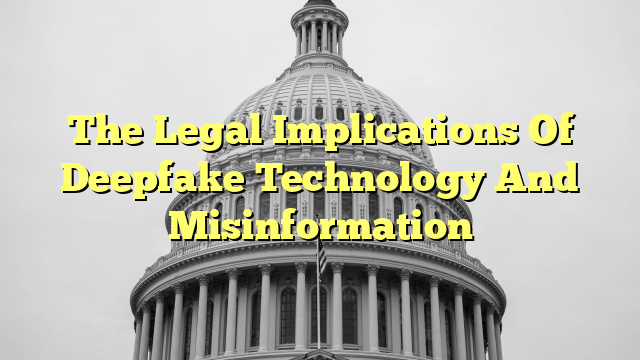In recent years, deepfake technology has rapidly advanced, with increased sophistication and accessibility. Deepfakes are videos, typically using artificial intelligence and machine learning, that can be used to create realistic video or audio of someone saying or doing something that never happened. This technology has enabled the spread of false information, manipulated for the purposes of political or personal gain. In response, the need to understand the legal implications of deepfakes has become increasingly urgent.
What are the legal issues with deepfake technology?
The legal implications of deepfake technology are far-reaching. Deepfakes can be used to spread false information and potentially defame or harm individuals, businesses, and governments. Deepfakes can also be used to create malicious propaganda or to manipulate stock markets and other financial markets, both of which have serious implications for public trust, safety, and security.
The legal issues associated with deepfakes also raise important questions about free speech and how it should be regulated. While it is important to protect freedom of speech, the potential for deepfakes to be used to spread false information or to manipulate public opinion has prompted many to call for better regulation of deepfakes. Additionally, deepfakes can be used to invade someone’s privacy, which is a serious legal concern.
Are there laws against deepfakes?
Currently, there are no federal laws explicitly addressing deepfakes in the United States. However, there are a number of laws that could be used to prosecute those who create and/or distribute deepfakes, depending on the circumstances. These laws include copyright law, defamation law, and privacy laws. Additionally, some states have passed laws specifically targeting deepfakes.
At the federal level, copyright law can be used to prosecute those who create and/or distribute deepfakes. This is because deepfakes are often created using copyrighted material, such as music or images. Defamation law can also be used to prosecute those who create and/or distribute deepfakes. Defamation law prohibits the spread of false information that harms the reputation of an individual or entity. Additionally, privacy laws can be used to prosecute those who create and/or distribute deepfakes, as deepfakes can be used to invade someone’s privacy.
What is the legal status of deepfakes?
The legal status of deepfakes is still in flux. While there are no federal laws explicitly addressing deepfakes, some states have passed laws prohibiting the creation or distribution of deepfakes. Additionally, many countries are considering laws that specifically address deepfakes, though most are still in the early stages of development. Additionally, various digital rights organizations have called for better regulation of deepfakes, as they believe that deepfakes are a potential threat to free speech.
What are the implications of deepfakes?
The implications of deepfakes are far-reaching. Deepfakes can be used to spread false information, manipulate public opinion, invade someone’s privacy, and potentially defame or harm individuals, businesses, and governments. Additionally, deepfakes can be used to create malicious propaganda or to manipulate stock markets and other financial markets. As a result, it is important to understand the legal implications of deepfakes and to consider how this technology should be regulated in order to protect the public and to uphold free speech.
Conclusion
The legal implications of deepfake technology are far-reaching and complex. Currently, there are no federal laws explicitly addressing deepfakes in the United States, though some states have passed laws prohibiting the creation or distribution of deepfakes. Additionally, many countries are considering laws that specifically address deepfakes. The implications of deepfakes are significant and as a result, it is important to understand the legal implications of deepfakes and to consider how this technology should be regulated in order to protect the public and to uphold free speech.


The misuse of deepfake technology is a serious legal issue as it creates opportunities for spreading wrongful information and untrustworthy content, which can have damaging implications.